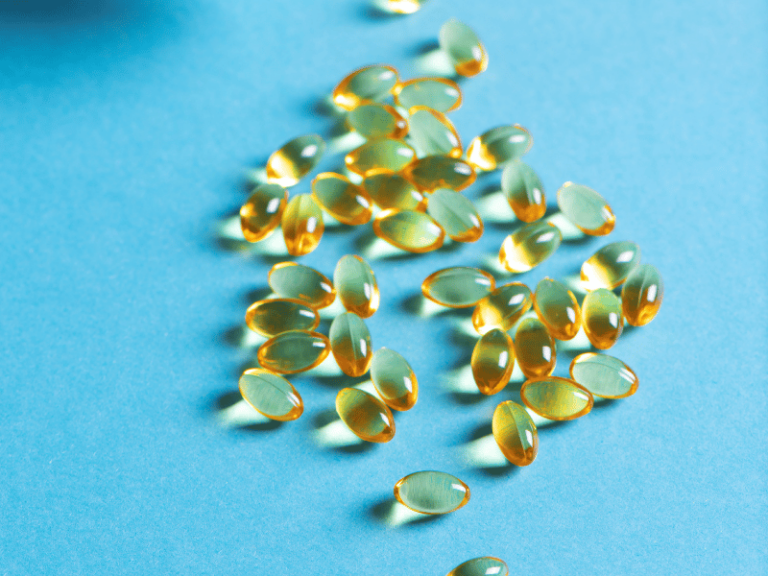Most people over 50 take at least one supplement – but that doesn’t always mean they’re taking the ones that make the biggest difference. Some nutrients don’t get much attention, yet quietly support the things that matter most with age: sleep quality, joint comfort, brain function, and overall energy. Magnesium, Astaxanthin, and Omega-3s are three supplements you might not have thought about – but they’re well worth a closer look. They’re not trends. They’re tools that help you feel more like yourself, more often.
1. Magnesium: For Rest, Recovery, and Staying Steady
Magnesium is involved in over 300 processes in the body. From keeping your muscles relaxed to regulating blood pressure and helping you fall asleep, this mineral plays central role in your health. As we age, our ability to absorb Magnesium decreases, and many medications can further reduce levels. Still, most multivitamins don’t include enough to make a difference.
What It Helps With:
- Sleep: Magnesium helps calm the nervous system and support melatonin production (1)
- Stress and Mood: It may reduce anxiety because it regulates stress hormones and supports neurotransmitters that affect mood (2,3)
- Muscle and Bone Health: Magnesium plays a role in maintaining the structure of bones and also helps reduce muscle cramps (4,5)
What to Look For:
When choosing a Magnesium supplement, the form matters. Magnesium glycinate is often considered the best because it is gentle on digestion and well-absorbed. Citrate and Malate are also solid options. Magnesium Oxide in high dosages can cause gastrointestinal upset and loose stool. However, in moderate doses and combined with other forms of Magnesium, Oxide can help with migraines and constipation.
Typical Dose: Magnesium supplements typically provide between 200-400 mg per day. How much you should take depends on your diet and health status so be sure to check with your doctor before starting any supplements.
READ OUR COMPLETE GUIDE TO MAGNESIUM AND DISCOVER WHY WE CHOSE A COMBINATION OF FORMS
Astaxanthin: Cellular Protection from the Inside Out
Astaxanthin isn’t a household name – but it should be. It’s a powerful antioxidant found in marine algae, and research suggests it Astaxanthin is a naturally occurring antioxidant derived from microalgae, known for its deep red color. It’s much stronger than Vitamin C or E in terms of oxidative stress protection, which becomes more important as we age. Unlike many antioxidants, Astaxanthin is stable and doesn’t turn into a pro-oxidant after use.
What It Helps With:
- Eye Health: Supports eye health and reduces risk of some eye diseases (6,7)
- Brain Health: May help protect neurons and support mental clarity over time (8)
- Joint Comfort: Can help manage inflammation that contributes to stiffness and soreness (8)
- Skin Aging: Helps protect skin cells from UV damage and supports hydration (8)
What to Look For:
Choose natural Astaxanthin (from Haematococcus pluvialis algae), not synthetic. It’s more effective and better studied.
Typical Dose: 4–12 mg daily, depending on your reason for taking it. It should ideally be taken with food containing healthy fat, to assist with absorption, and with permission from your doctor especially if you have any medical conditions.
DISCOVER MORE ABOUT THE POWERFUL EFFECTS OF ASTAXANTHIN
Omega-3s: The Daily Fat You Might Be Missing
Omega-3 fatty acids (EPA and DHA) are essential for brain, heart, and joint health – but the body doesn’t produce them on its own. That means we have to get them from food or supplements. Fatty fish is the best source, but many people don’t eat enough of it regularly.
What It Helps With:
- Heart Health: Studies show that higher Omega-3 consumption is linked to a lowered risk of heart diseases (9)
- Cognitive Function: Linked to memory, focus, and slower mental decline with age (9)
- Inflammation Management: Helps reduce joint discomfort and morning stiffness (9)
What to Look For:
Look for high-purity fish or krill oil with at least 250–500 mg of combined EPA and DHA per serving. We recommend choosing a product (like ours!) that is Friend of the Sea certified to ensure proper care for the environment
Typical Dose: The recommended dosage for Omega-3/fish oil supplements varies based on health conditions. It can be as low as 250 mg or as high 4,000 mg daily, or somewhere in between. You doctor can advise you based on your specific health concerns.
DISCOVER IF RESEARCH VERIFIED OMEGA-3 LIVES UP TO THE HYPE
Conclusion: Why These Matter So Much
Magnesium, Astaxanthin, and Omega-3s aren’t trendy or new – but they are effective. Each one supports your body in a different but important way. Together, they help cover common gaps in nutrition that can quietly affect how you sleep, how you move, how clearly you think, and how much energy you bring to your day.
What sets these supplements apart is that they don’t just support long-term health goals. They can also make a difference in how you feel right now. Less stiffness in the morning. A clearer head. More restful sleep. These aren’t dramatic changes – but they’re noticeable. And sometimes, it’s those everyday improvements that matter most.




Comments are closed.